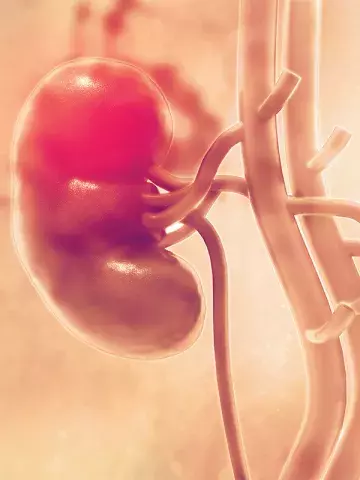Modest reduction in kidney function linked to adverse outcomes
By Rebecca Jenkins
Even a modest loss of kidney function is associated with an increased risk of adverse health outcomes, particularly in younger adults, a large populationbased cohort study finds.
Chronic kidney disease is currently characterised by a reduced estimated glomerular filtration rate (eGFR) of less than 60mL/min/1.73m2 for at least 90 days, regardless of age, the Canadian researchers wrote in The BMJ. However, they noted adults aged under 40 years have mean eGFRs of more than 100mL/min/1.73m2 and had to lose a large amount of kidney function before being diagnosed with chronic kidney disease using the eGFR threshold of 60mL/min/1.73m2.
Using linked healthcare datasets in Ontario, the researchers gathered data on adverse health outcomes from more than 8 million adults aged 18 to 65 years who had at least one outpatient eGFR reading and no history of kidney disease.
Over a median follow up of 9.2 years, the researchers found modest eGFR reductions above the threshold of 60 mL/min/1.73 m2, but below age specific references, were consistently linked with higher rates of adverse events.
The age specific references were 100 to 110mL/min/1.73m2 for ages 18 to 39 years, 90 to 100 for ages 40 to 49 years and 80 to 90 for ages 50 to 65 years.
The higher relative risks were most prominent and occurred as early as less than 80mL/min/1.73m2 among younger adults (18 to 39 years) compared with middle and older groups, the researchers reported.
For modest reductions (eGFR 70 to 80mL/min/1.73m2), the hazard ratio of a composite adverse outcome (all-cause mortality, any cardiovascular event and kidney failure) was 1.42 for ages 18 to 39 years, 1.13 for ages 40 to 49 years and 1.08 for ages 50 to 65 years.
‘This disparity between age groups persisted after account ing for various underlying differences in kidney function, albuminuria, and across sex and comorbidity-based strata,’ the researchers wrote.
Associate Professor Vincent Lee, Nephrologist at Westmead Hospital in Sydney and Academic Lead (Medicine) of the Western Clinical School of The University of Sydney, said the study added thought provoking data on the implications of modestly reduced eGFR especially in younger individuals.
‘This has potential applications in terms of the need for screening for chronic kidney disease in populations that traditionally have not been targeted and the optimal method to assess and manage individuals identified with low eGFR,’ he told Medicine Today.
‘This also highlights that there may be value in using age based reference ranges for eGFR rather than the “one-size-fits-all” eGFR cut-off of 60mL/min/1.73m2.’
However, further work would also be needed to establish how the findings from a population-based study could be used for individual assessment.
‘Development of validated risk calculators which can tailor to an individual’s prognosis and applicable to a wide variety of populations is required. The costeffectiveness of any screening program would also need to be assessed carefully,’ Professor Lee said.
BMJ 2023; 381: e075062. http://dx.doi.org/10.1136/bmj 2023 075062.
Image © Crystal Light/shutterstock.com


